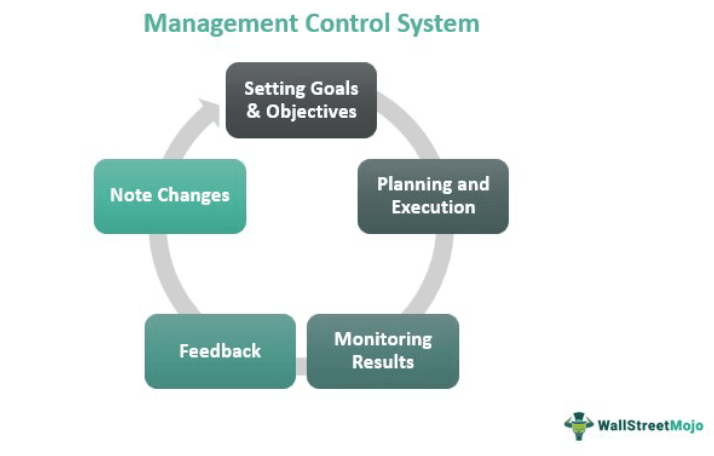Table Of Contents
What Is Management Control System (MCS)?
A management control system or MCS is a framework that allows organizations to compare the actual outcomes with their goals and objectives set by them. The results of MCS are considered for making important decisions about the future course of action within the organization. This system can be formal or informal.

MCS is a means of measurement that determines the quantum of actual results compared with goals and objectives in terms of profits and efficiency in a particular period. In addition, the management control system process helps managers identify improvement areas in processes that might hinder the overall growth of the organization. Also, MCS is a continuous and all-pervasive process that organizations conduct multiple times.
Key Takeaways
- A management control system is the tool through which organizations assess the actual outcomes compared to pre-determined goals.
- MCS can be a combination of formal and informal control forms. The balance addresses the non-negotiables such as performance and quality. On the other hand, informal control ensures motivation levels and unity are in check.
- This system allows individual and organizational goals to align, and achieving personal goals automatically adds to fulfilling the organization's goals.
- The application of MCS helps top-level management make better decisions based on the reports.
Management Control System Explained
A management control system (MCS) is a tool that helps an organization track the actual outcomes instead of their goals and objectives in quantitative terms. This allows the managers and top-level management to make crucial decisions regarding improving organizational processes and activities.
The MCS framework can be both formal and informal. Under a formal control system, organizations have established rules, plans, procedures, and guidelines for different facets of daily functioning. These rules and techniques facilitate the managers and other staff to get a fair idea of their responsibilities and a peek into the organization's objectives. Examples of formal systems include human resource systems, cost accounting systems, and quality management systems.
On the contrary, informal control systems are unwritten and undeclared. Nevertheless, they contribute significantly towards building unity and motivating the employees within the organization—for example, unwritten norms of shared values, loyalty towards the organization, and behavior.
The significance of installing this system is to ensure that individuals and organizational goals are congruent. Therefore, it is wise to provide enough incentives or rewards for them to stay motivated to achieve their goals and fulfill the organizational goals.
Therefore, companies must install a foolproof evaluation system where the managers can assign responsibilities and tasks, and employees can report their performance without deviations.
Characteristics
An effective management control system must have characteristics that align with the organization's goals and objectives. Although MCS differs from organization to organization depending on their goals, nature of business, and management styles, the following characteristics help curate a better MCS system:
#1 - Alignment
The MCS must align with the organization's larger scheme of things. It must fit the organization's structure, be congruent with the objectives and goals, and help the decision-making process.
#2 - Rewards
Management control techniques must motivate employees across departments and stature to work towards their individual and organizational goals through regular incentives and rewards.
#3 - Decision-Making
The MCS must be able to process data and provide the managers with helpful information to make decisions and facilitate improvements in processes and daily activities within the organization.
#4 - Measurability
The system’s main objective is to provide data points that help the organization achieve optimal efficiency levels concerning its goals. Therefore, ensuring that the metrics in contention for measuring the performance are measurable in real terms is essential.
#5 - Communication
When a variation from the goals set for a particular employee or a department is detected, the system needs to communicate to the assessor about the divergence from the set goals.
Types
Different managements use different types of MCS to measure their performances. However, the three major types of systems are:
- Output Control
- Behavioural Control
- Clan Control
Usually, managers or top executives use all three types in a combination that fits their management styles. Let us discuss them briefly through the points below:
#1 - Output Control
Output control refers to the outcomes or performances within the organization. First, managers deliver clear-cut communication regarding an acceptable level of performance and the evaluation criteria. Then, they measure performances against expectations and make necessary changes. Finally, they reward the employee if the version exceeds the set limits or expectations.
#2 - Behavioral Control
Behavioral control is centered around actions instead of outputs. First, managers lay down a well-defined process or plan for the employees across levels of the organization. Then, they set behavior rules to ensure the organization's environment is healthy and conducive to growth. Moreover, it also ensures motivation levels remain high among employees.
#3 - Clan Control
Clan control is a non-standardized and informal system with no written or specified rules. However, it is based on employees' values, norms, traditions, and expectations. These control systems help employees feel a sense of belonging to the organization.
Factors
Let us understand the factors influencing the application of management control system techniques through the points below:
#1 - Size & Reach
Big organizations have a noticeable difference in reach within and outside the organization compared to small enterprises. Additionally, the organization's structure becomes complex as it grows, making the MCS system more complex. Since the process of decentralization and delegation is different for different organizations irrespective of similarity in size, it is a factor to consider while curating an MCS system.
#2 - Nature of Operations
Nature of operations refers to the kind of business the organization carries out. For example, if the company produces a single product or a limited number of products, the complexity of the MCS system could be much higher. However, if the company has multiple products across domains, it might require more departments to ensure control over vital factors of production. Therefore, the MCS system also gets added complexity in evaluation and feedback.
#3 - Divisibility
Divisibility is the extension of the nature of business. The larger the organization, the more the divisibility of responsibilities. Organizations prefer having departments specializing in one task rather than being occupied with multiple tasks. Thereby, the MCS has a more precise metric of measurement.
#4 - Heterogeneous Responsibilities
Some responsibilities can be measured in terms of profitability; others are best measured through expenses or return on investment. Therefore, the number of MCS also increases with the type of responsibilities within the organization. As the duties are heterogeneous, they have to measure in terms that fit their functionality better.
#5 - Employee Perceptions
One of the trickiest parts of devising an MCS process into action is ensuring employees' perceptions are taken into account. Even though different people might have different opinions about the system and its metrics, it is helpful that most employees look for job security, general well-being, and job satisfaction.
The consideration of perceptions helps in applying the right metrics to evaluate performances.
Examples
Let us understand the concept better with the help of a couple of examples:
Example #1
Glaze, Inc. is a manufacturer of beauty products in Los Angeles. The previous year, they had set a target of $15 million in sales and fell short by $4 million. To have a close eye on the shortcomings and inconsistencies in the process, they decided to install a control system.
In a couple of months, they streamlined their warehousing and customer support departments through feedback from the control system. This feedback helped employees and managers understand the gap between expectations and actual outcomes. The following year, Glaze Inc. doubled its sales, and its profits grew by 36%.
Examples #2
In January 2023, the Nigerian Federal Government announced its plans to incorporate an MCS system that improves the accountability of their employees and provides timely services.
This disclosure was made by the head of the civil service, Dr. Foladade Yemi-Esan. She also declared the formulation of SOPs for employees to ensure the execution of this plan is performed to perfection.
Advantages & Disadvantages
Let us discuss the advantages and disadvantages of MCS through the points below:
Advantages
#1 - Information
An efficient MCS provides information from different data points that allow the management to make better decisions and measure the actual level of performance.
#2 - Clarity
The plan for each department and employee is clearly set and thus helps them work towards personal and company goals with a better understanding of their goals.
#3 - Bridging Gaps
The MCS acts as the bridge between employees and their managers. Communication to and for is more accessible with the system in place. Moreover, it makes evaluation a more straightforward task as the basis for assessment is clear to both the assessor and assessee.
#4 - Coordination
Installing an MCS in the organization leads to better coordination as everyone is clear on their responsibilities. These individual responsibilities add up to fulfill the organization's goals, and coordination for managers becomes a more straightforward task.
#5 - Forecasting
Using data points from past evaluation cycles, the system can forecast a particular level of performance at individual and organizational levels. This forecast can be a vital source of information that helps the managerial team make critical decisions.
Disadvantages
#1 - Time Factor
Timely and accurate feedback is the primary function of the control system. The feedback is based on the written reports submitted by managers. However, this process might take time and effort to fill in correctly for evaluation. Moreover, at fast-paced factory floors where activities are at a rapid pace, the feedback based on the report might need to be updated.
#2 - Too Much Information
An information overload is as significant a hindrance as low information for managers. A series of data thrown at managers might burden them with providing information before their teams can take action. Therefore, the management must decide the type of information and what quantity must reach the managers.
#3 - Reluctance
Often employees see control systems as a phenomenon that overburdens them with responsibilities and creates extra pressure. In addition, the feedback mechanism is only comfortable for some employees as their organizational activities are constantly monitored. Therefore, employees must be convinced and onboarded before completely installing the control system.

